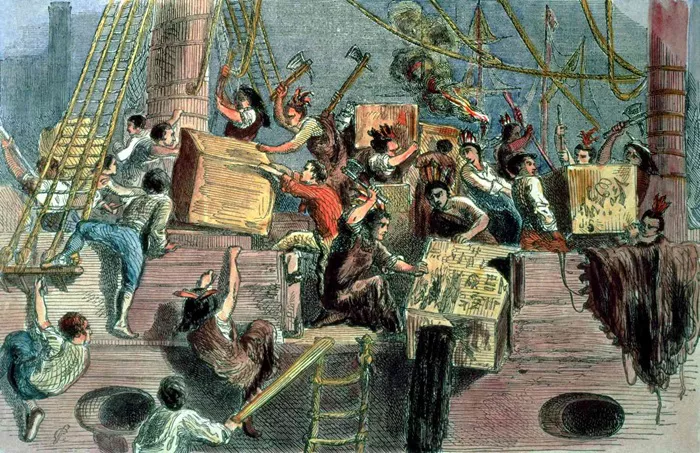December 16 is a significant date in American history, marked by several notable events that have shaped the nation. This article will explore these events in detail, emphasizing their context and impact.
What Happened on December 16 in American History?
The Boston Tea Party (1773)
The Boston Tea Party was a pivotal event leading up to the American Revolution. It occurred on December 16, 1773, when American colonists protested against British taxation without representation. The British government had imposed the Tea Act, which allowed the British East India Company to sell tea directly to the colonies, undercutting local merchants and enforcing a tax on tea that many colonists found unacceptable.The EventOn that fateful night, a group of colonists, disguised as Mohawk Indians to conceal their identities, boarded three ships in Boston Harbor: the Dartmouth, the Eleanor, and the Beaver. They proceeded to dump 342 chests of tea—worth approximately £10,000—into the harbor. This act of defiance was not just about tea; it symbolized the growing resentment towards British rule and taxation policies.
The Boston Tea Party had immediate and far-reaching consequences. In retaliation, the British government enacted the Coercive Acts (also known as the Intolerable Acts) in 1774, which further restricted colonial autonomy and fueled revolutionary sentiments. This event united many colonists against what they viewed as oppressive governance and set the stage for the First Continental Congress and subsequent revolutionary actions.
The Great White Fleet Sets Sail (1907)
On December 16, 1907, President Theodore Roosevelt ordered the Great White Fleet to embark on a significant journey around the world. This fleet consisted of 16 battleships painted white to symbolize peace and was intended to showcase American naval power.
The fleet departed from Hampton Roads, Virginia, on a 14-month voyage that included stops at various ports across the globe. The primary purpose was to demonstrate America’s growing military capabilities and assert its position as a global power during an era marked by imperial competition among nations.
The Great White Fleet’s voyage had several implications. It helped to strengthen diplomatic relations with countries like Japan and showcased America’s commitment to maintaining peace while also being prepared for conflict if necessary. The successful voyage also boosted national pride and confidence in American military strength.
The Battle of the Bulge Begins (1944)
The Battle of the Bulge was one of the last major German offensives on the Western Front during World War II. It began on December 16, 1944, as German forces launched a surprise attack against Allied troops through the Ardennes Forest in Belgium and Luxembourg.
The Germans aimed to split Allied forces and capture Antwerp, ultimately hoping to encircle and destroy four Allied armies. The attack caught many Allied troops off guard due to poor weather conditions that limited air support and reconnaissance.
Despite initial successes and significant territorial gains by German forces, Allied troops regrouped and counterattacked. The battle lasted until January 25, 1945, resulting in heavy casualties on both sides but ultimately leading to an Allied victory. This battle marked a turning point in the war as it depleted German resources and hastened their defeat in Europe.
United Airlines DC-8 Collision (1960)
On December 16, 1960, a tragic aviation accident occurred over New York City when a United Airlines DC-8 collided with a TWA Super Constellation. This incident remains one of the deadliest aviation disasters in U.S. history.
The collision happened at approximately 10:30 AM when both aircraft were approaching New York’s Idlewild Airport (now John F. Kennedy International Airport). Poor visibility due to fog contributed to miscommunication between air traffic control and the pilots of both planes.
A total of 134 people lost their lives in this disaster—95 aboard the United Airlines flight and 39 on TWA’s aircraft. This incident prompted significant changes in aviation safety regulations and procedures regarding air traffic control communication.
George W. Bush Selects Colin Powell (2000)
On December 16, 2000, President-elect George W. Bush made a historic announcement by selecting Colin Powell as his Secretary of State. Powell was a retired four-star general in the U.S. Army and had previously served as Chairman of the Joint Chiefs of Staff.
Powell’s selection was groundbreaking as he became the first African American to hold this position. His appointment symbolized a step towards greater diversity within high-level government positions in America.
During his tenure from January 2001 until his resignation in 2005, Powell played a crucial role in shaping U.S. foreign policy during a tumultuous period marked by events such as September 11 attacks and subsequent military actions in Afghanistan and Iraq.
Conclusion
December 16 has witnessed numerous significant events throughout American history that reflect broader social changes, military developments, and political milestones. From revolutionary protests against British taxation to modern-day appointments that signify progress toward inclusivity, each event contributes uniquely to America’s narrative. Understanding these moments provides valuable insight into how past actions shape current realities and future trajectories within American society.
Related Topics:

